Impacts of IFRS Adoption in Australia - Enhancing Accounting Quality
VerifiedAdded on 2023/06/12
|13
|2407
|72
AI Summary
The enactment of International Financing Reporting Standards (IFRS) has brought about the enhancement of accounting quality. IFRS generates the foundation of all manner of reporting in all sectors either a profit-making or a nonprofit business entity. This report has outlined the various impacts after the adoption of the IFRS in Australia which is evident in the financial statements thus establishing a development in accounting quality. This research study also enlightens us on the relationship between the IFRS and the Australian Accounting Standard Board (AASB).
Contribute Materials
Your contribution can guide someone’s learning journey. Share your
documents today.
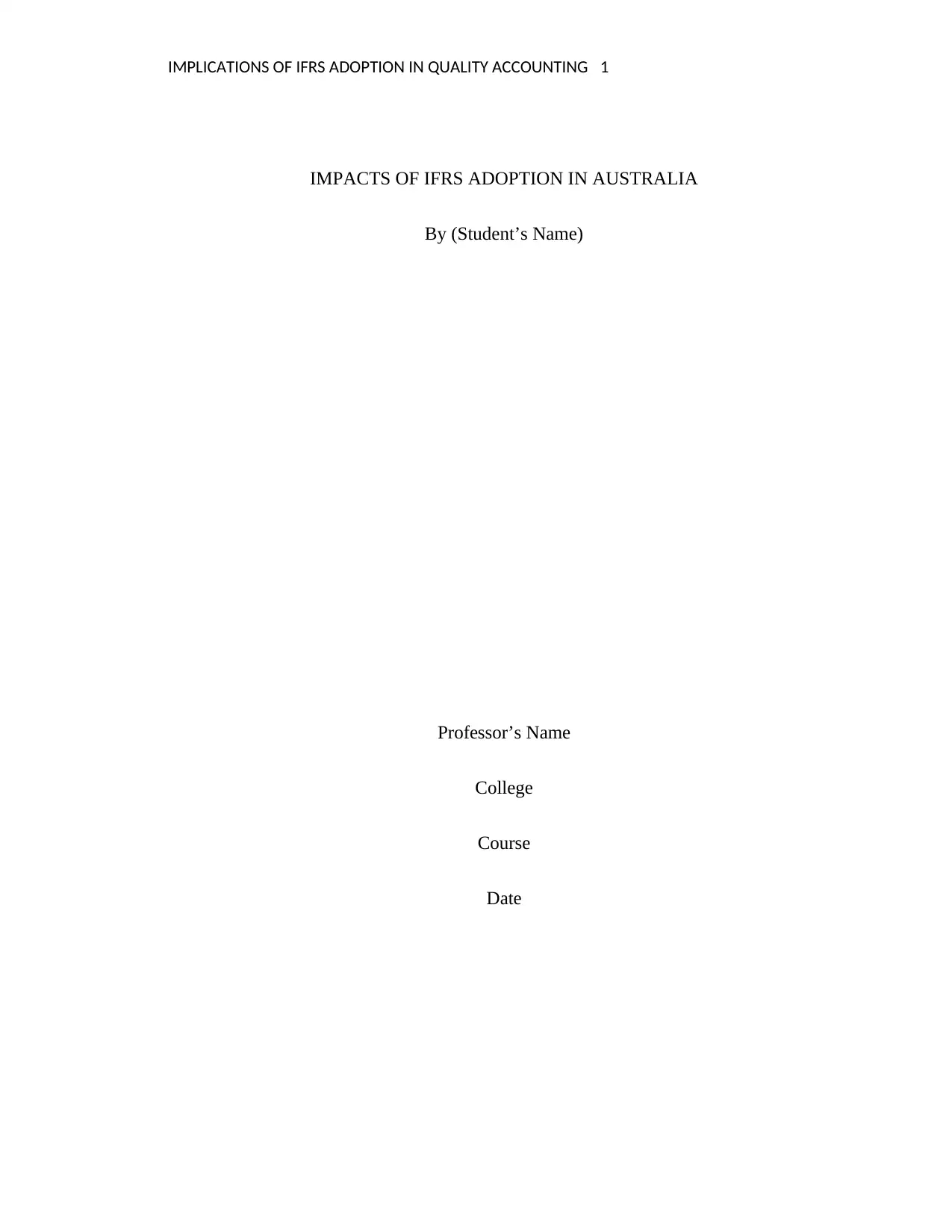
IMPLICATIONS OF IFRS ADOPTION IN QUALITY ACCOUNTING 1
IMPACTS OF IFRS ADOPTION IN AUSTRALIA
By (Student’s Name)
Professor’s Name
College
Course
Date
IMPACTS OF IFRS ADOPTION IN AUSTRALIA
By (Student’s Name)
Professor’s Name
College
Course
Date
Secure Best Marks with AI Grader
Need help grading? Try our AI Grader for instant feedback on your assignments.
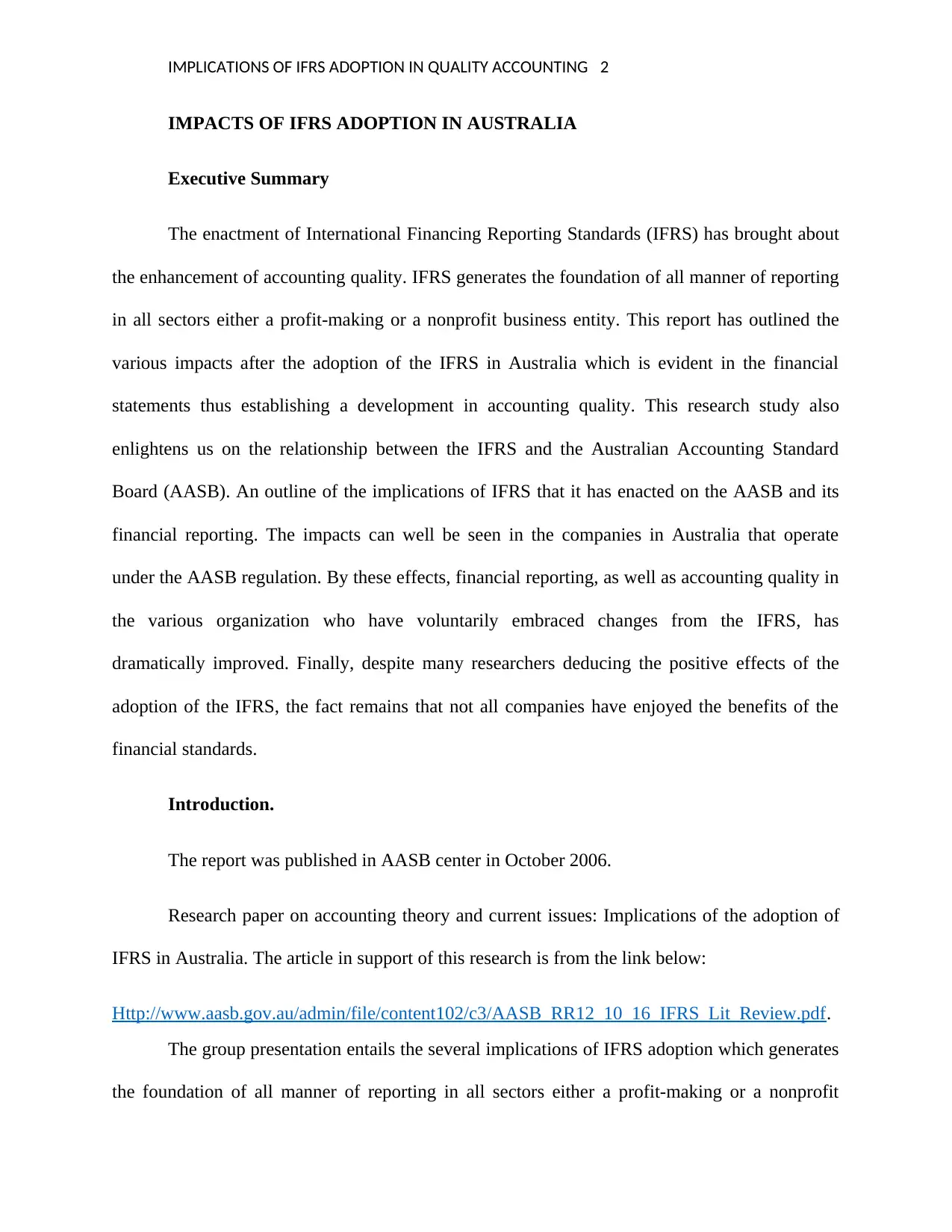
IMPLICATIONS OF IFRS ADOPTION IN QUALITY ACCOUNTING 2
IMPACTS OF IFRS ADOPTION IN AUSTRALIA
Executive Summary
The enactment of International Financing Reporting Standards (IFRS) has brought about
the enhancement of accounting quality. IFRS generates the foundation of all manner of reporting
in all sectors either a profit-making or a nonprofit business entity. This report has outlined the
various impacts after the adoption of the IFRS in Australia which is evident in the financial
statements thus establishing a development in accounting quality. This research study also
enlightens us on the relationship between the IFRS and the Australian Accounting Standard
Board (AASB). An outline of the implications of IFRS that it has enacted on the AASB and its
financial reporting. The impacts can well be seen in the companies in Australia that operate
under the AASB regulation. By these effects, financial reporting, as well as accounting quality in
the various organization who have voluntarily embraced changes from the IFRS, has
dramatically improved. Finally, despite many researchers deducing the positive effects of the
adoption of the IFRS, the fact remains that not all companies have enjoyed the benefits of the
financial standards.
Introduction.
The report was published in AASB center in October 2006.
Research paper on accounting theory and current issues: Implications of the adoption of
IFRS in Australia. The article in support of this research is from the link below:
Http://www.aasb.gov.au/admin/file/content102/c3/AASB_RR12_10_16_IFRS_Lit_Review.pdf.
The group presentation entails the several implications of IFRS adoption which generates
the foundation of all manner of reporting in all sectors either a profit-making or a nonprofit
IMPACTS OF IFRS ADOPTION IN AUSTRALIA
Executive Summary
The enactment of International Financing Reporting Standards (IFRS) has brought about
the enhancement of accounting quality. IFRS generates the foundation of all manner of reporting
in all sectors either a profit-making or a nonprofit business entity. This report has outlined the
various impacts after the adoption of the IFRS in Australia which is evident in the financial
statements thus establishing a development in accounting quality. This research study also
enlightens us on the relationship between the IFRS and the Australian Accounting Standard
Board (AASB). An outline of the implications of IFRS that it has enacted on the AASB and its
financial reporting. The impacts can well be seen in the companies in Australia that operate
under the AASB regulation. By these effects, financial reporting, as well as accounting quality in
the various organization who have voluntarily embraced changes from the IFRS, has
dramatically improved. Finally, despite many researchers deducing the positive effects of the
adoption of the IFRS, the fact remains that not all companies have enjoyed the benefits of the
financial standards.
Introduction.
The report was published in AASB center in October 2006.
Research paper on accounting theory and current issues: Implications of the adoption of
IFRS in Australia. The article in support of this research is from the link below:
Http://www.aasb.gov.au/admin/file/content102/c3/AASB_RR12_10_16_IFRS_Lit_Review.pdf.
The group presentation entails the several implications of IFRS adoption which generates
the foundation of all manner of reporting in all sectors either a profit-making or a nonprofit
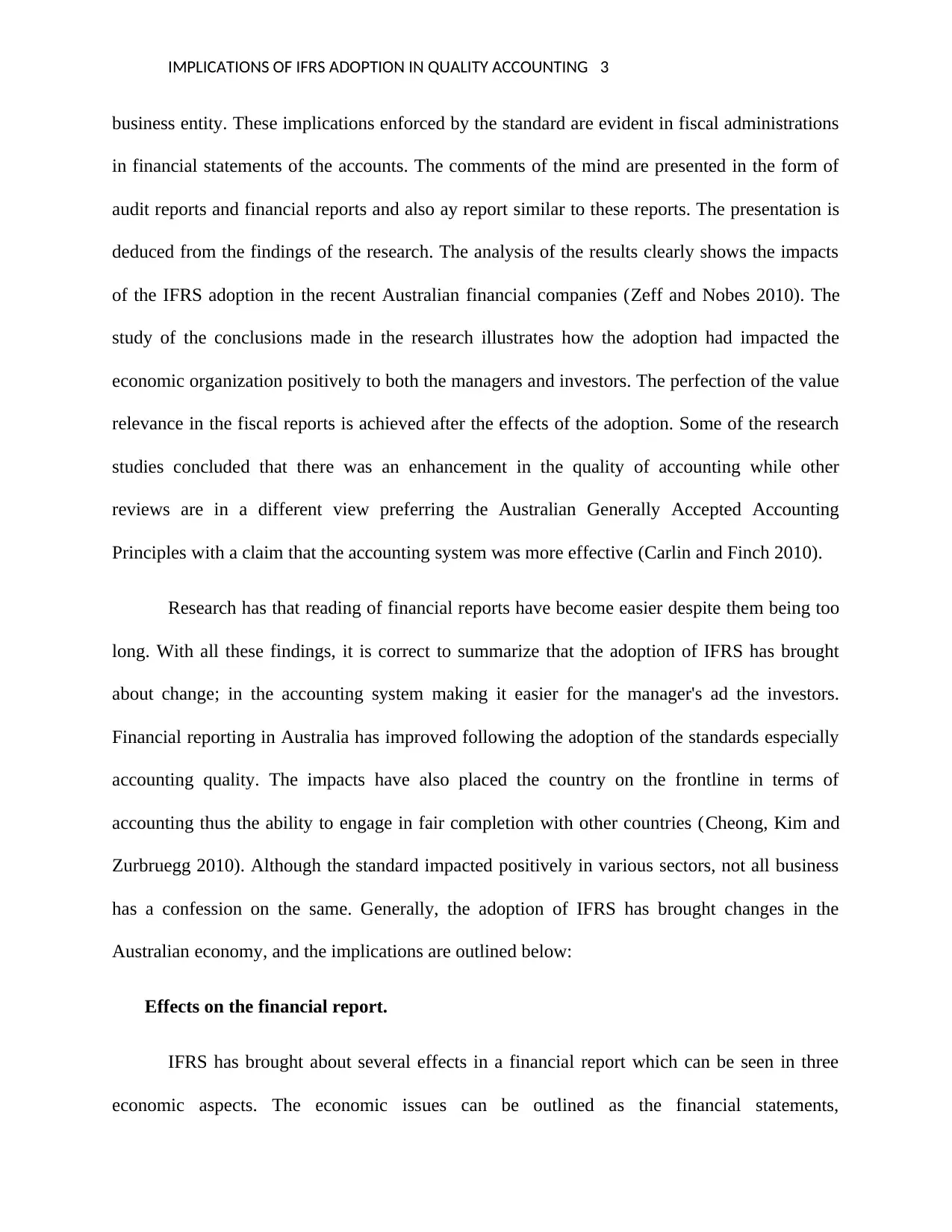
IMPLICATIONS OF IFRS ADOPTION IN QUALITY ACCOUNTING 3
business entity. These implications enforced by the standard are evident in fiscal administrations
in financial statements of the accounts. The comments of the mind are presented in the form of
audit reports and financial reports and also ay report similar to these reports. The presentation is
deduced from the findings of the research. The analysis of the results clearly shows the impacts
of the IFRS adoption in the recent Australian financial companies (Zeff and Nobes 2010). The
study of the conclusions made in the research illustrates how the adoption had impacted the
economic organization positively to both the managers and investors. The perfection of the value
relevance in the fiscal reports is achieved after the effects of the adoption. Some of the research
studies concluded that there was an enhancement in the quality of accounting while other
reviews are in a different view preferring the Australian Generally Accepted Accounting
Principles with a claim that the accounting system was more effective (Carlin and Finch 2010).
Research has that reading of financial reports have become easier despite them being too
long. With all these findings, it is correct to summarize that the adoption of IFRS has brought
about change; in the accounting system making it easier for the manager's ad the investors.
Financial reporting in Australia has improved following the adoption of the standards especially
accounting quality. The impacts have also placed the country on the frontline in terms of
accounting thus the ability to engage in fair completion with other countries (Cheong, Kim and
Zurbruegg 2010). Although the standard impacted positively in various sectors, not all business
has a confession on the same. Generally, the adoption of IFRS has brought changes in the
Australian economy, and the implications are outlined below:
Effects on the financial report.
IFRS has brought about several effects in a financial report which can be seen in three
economic aspects. The economic issues can be outlined as the financial statements,
business entity. These implications enforced by the standard are evident in fiscal administrations
in financial statements of the accounts. The comments of the mind are presented in the form of
audit reports and financial reports and also ay report similar to these reports. The presentation is
deduced from the findings of the research. The analysis of the results clearly shows the impacts
of the IFRS adoption in the recent Australian financial companies (Zeff and Nobes 2010). The
study of the conclusions made in the research illustrates how the adoption had impacted the
economic organization positively to both the managers and investors. The perfection of the value
relevance in the fiscal reports is achieved after the effects of the adoption. Some of the research
studies concluded that there was an enhancement in the quality of accounting while other
reviews are in a different view preferring the Australian Generally Accepted Accounting
Principles with a claim that the accounting system was more effective (Carlin and Finch 2010).
Research has that reading of financial reports have become easier despite them being too
long. With all these findings, it is correct to summarize that the adoption of IFRS has brought
about change; in the accounting system making it easier for the manager's ad the investors.
Financial reporting in Australia has improved following the adoption of the standards especially
accounting quality. The impacts have also placed the country on the frontline in terms of
accounting thus the ability to engage in fair completion with other countries (Cheong, Kim and
Zurbruegg 2010). Although the standard impacted positively in various sectors, not all business
has a confession on the same. Generally, the adoption of IFRS has brought changes in the
Australian economy, and the implications are outlined below:
Effects on the financial report.
IFRS has brought about several effects in a financial report which can be seen in three
economic aspects. The economic issues can be outlined as the financial statements,
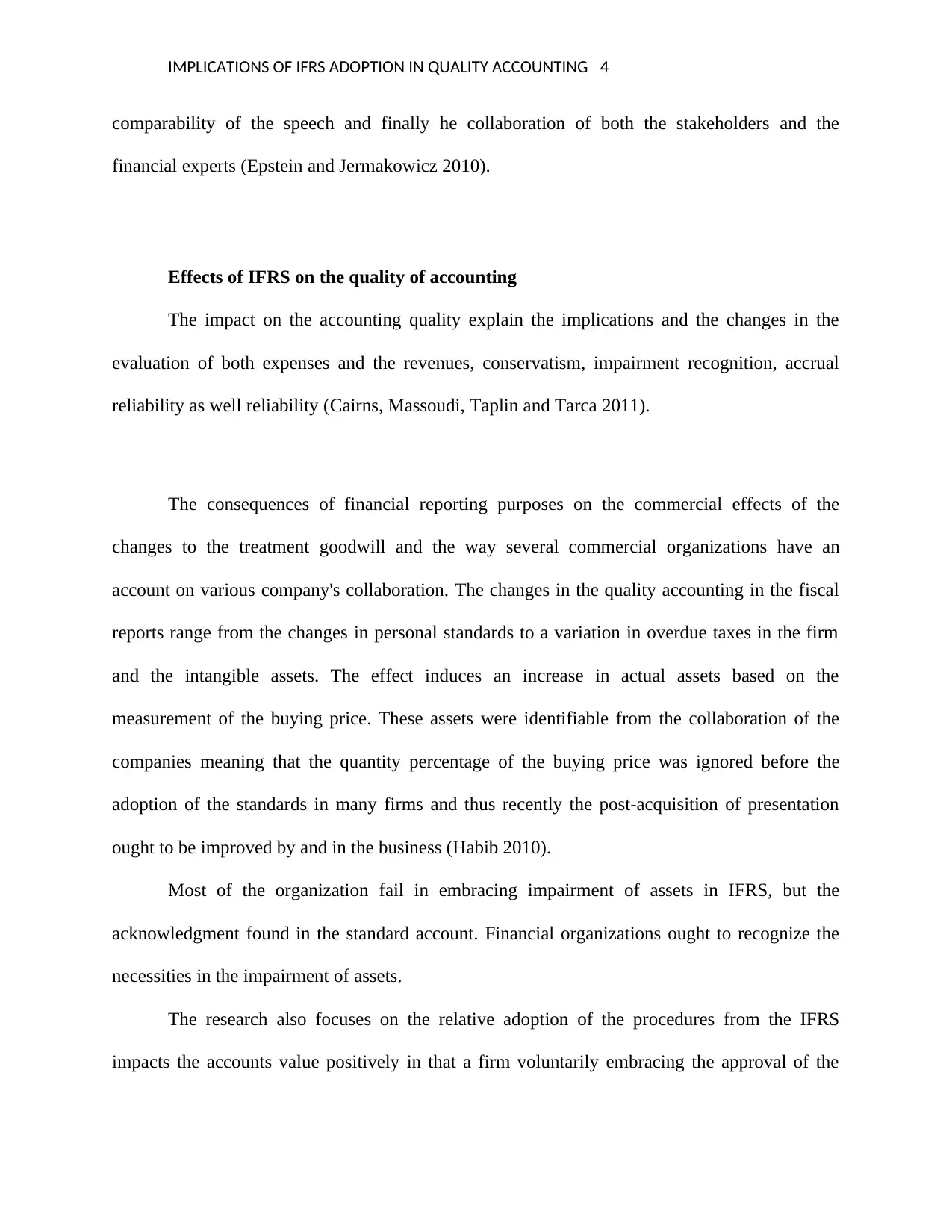
IMPLICATIONS OF IFRS ADOPTION IN QUALITY ACCOUNTING 4
comparability of the speech and finally he collaboration of both the stakeholders and the
financial experts (Epstein and Jermakowicz 2010).
Effects of IFRS on the quality of accounting
The impact on the accounting quality explain the implications and the changes in the
evaluation of both expenses and the revenues, conservatism, impairment recognition, accrual
reliability as well reliability (Cairns, Massoudi, Taplin and Tarca 2011).
The consequences of financial reporting purposes on the commercial effects of the
changes to the treatment goodwill and the way several commercial organizations have an
account on various company's collaboration. The changes in the quality accounting in the fiscal
reports range from the changes in personal standards to a variation in overdue taxes in the firm
and the intangible assets. The effect induces an increase in actual assets based on the
measurement of the buying price. These assets were identifiable from the collaboration of the
companies meaning that the quantity percentage of the buying price was ignored before the
adoption of the standards in many firms and thus recently the post-acquisition of presentation
ought to be improved by and in the business (Habib 2010).
Most of the organization fail in embracing impairment of assets in IFRS, but the
acknowledgment found in the standard account. Financial organizations ought to recognize the
necessities in the impairment of assets.
The research also focuses on the relative adoption of the procedures from the IFRS
impacts the accounts value positively in that a firm voluntarily embracing the approval of the
comparability of the speech and finally he collaboration of both the stakeholders and the
financial experts (Epstein and Jermakowicz 2010).
Effects of IFRS on the quality of accounting
The impact on the accounting quality explain the implications and the changes in the
evaluation of both expenses and the revenues, conservatism, impairment recognition, accrual
reliability as well reliability (Cairns, Massoudi, Taplin and Tarca 2011).
The consequences of financial reporting purposes on the commercial effects of the
changes to the treatment goodwill and the way several commercial organizations have an
account on various company's collaboration. The changes in the quality accounting in the fiscal
reports range from the changes in personal standards to a variation in overdue taxes in the firm
and the intangible assets. The effect induces an increase in actual assets based on the
measurement of the buying price. These assets were identifiable from the collaboration of the
companies meaning that the quantity percentage of the buying price was ignored before the
adoption of the standards in many firms and thus recently the post-acquisition of presentation
ought to be improved by and in the business (Habib 2010).
Most of the organization fail in embracing impairment of assets in IFRS, but the
acknowledgment found in the standard account. Financial organizations ought to recognize the
necessities in the impairment of assets.
The research also focuses on the relative adoption of the procedures from the IFRS
impacts the accounts value positively in that a firm voluntarily embracing the approval of the
Secure Best Marks with AI Grader
Need help grading? Try our AI Grader for instant feedback on your assignments.
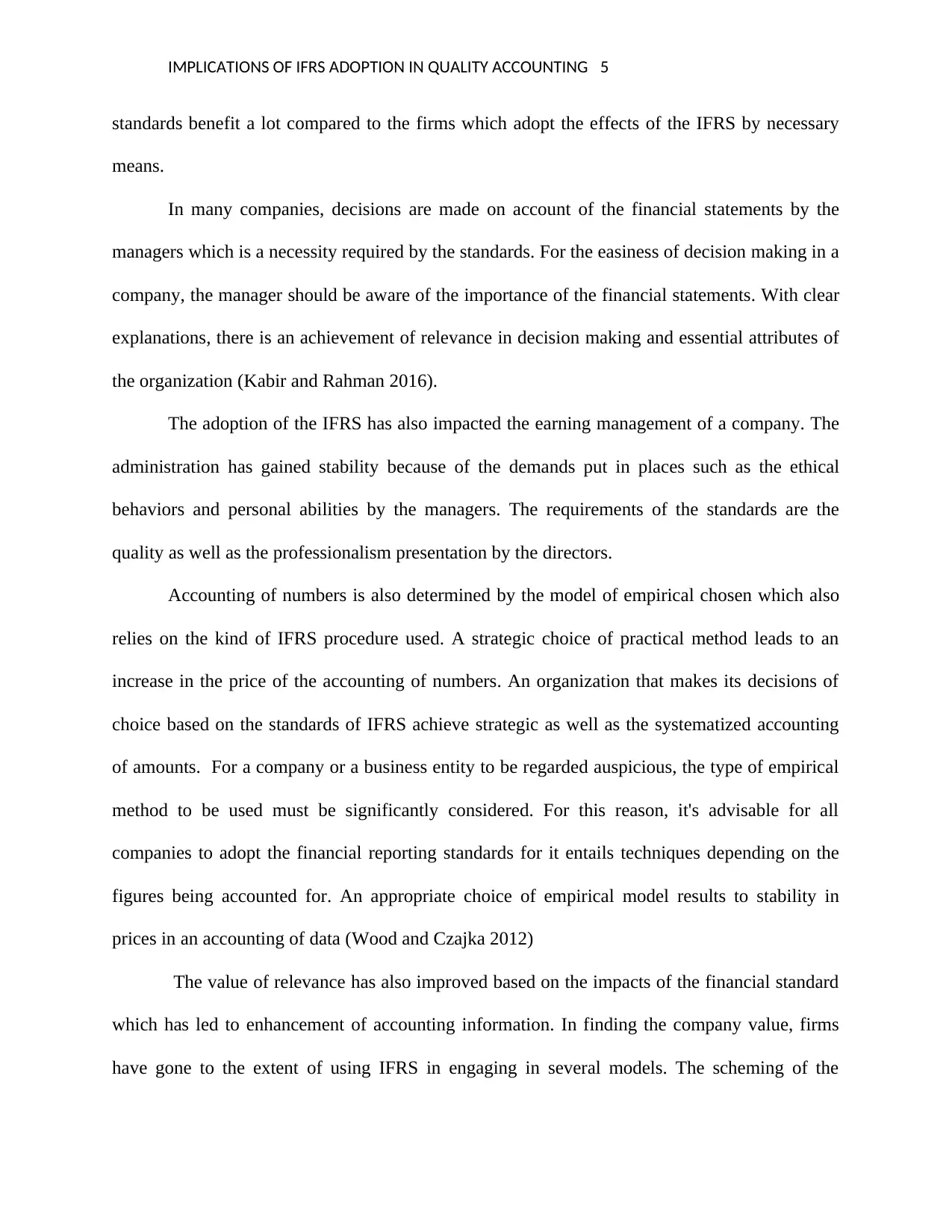
IMPLICATIONS OF IFRS ADOPTION IN QUALITY ACCOUNTING 5
standards benefit a lot compared to the firms which adopt the effects of the IFRS by necessary
means.
In many companies, decisions are made on account of the financial statements by the
managers which is a necessity required by the standards. For the easiness of decision making in a
company, the manager should be aware of the importance of the financial statements. With clear
explanations, there is an achievement of relevance in decision making and essential attributes of
the organization (Kabir and Rahman 2016).
The adoption of the IFRS has also impacted the earning management of a company. The
administration has gained stability because of the demands put in places such as the ethical
behaviors and personal abilities by the managers. The requirements of the standards are the
quality as well as the professionalism presentation by the directors.
Accounting of numbers is also determined by the model of empirical chosen which also
relies on the kind of IFRS procedure used. A strategic choice of practical method leads to an
increase in the price of the accounting of numbers. An organization that makes its decisions of
choice based on the standards of IFRS achieve strategic as well as the systematized accounting
of amounts. For a company or a business entity to be regarded auspicious, the type of empirical
method to be used must be significantly considered. For this reason, it's advisable for all
companies to adopt the financial reporting standards for it entails techniques depending on the
figures being accounted for. An appropriate choice of empirical model results to stability in
prices in an accounting of data (Wood and Czajka 2012)
The value of relevance has also improved based on the impacts of the financial standard
which has led to enhancement of accounting information. In finding the company value, firms
have gone to the extent of using IFRS in engaging in several models. The scheming of the
standards benefit a lot compared to the firms which adopt the effects of the IFRS by necessary
means.
In many companies, decisions are made on account of the financial statements by the
managers which is a necessity required by the standards. For the easiness of decision making in a
company, the manager should be aware of the importance of the financial statements. With clear
explanations, there is an achievement of relevance in decision making and essential attributes of
the organization (Kabir and Rahman 2016).
The adoption of the IFRS has also impacted the earning management of a company. The
administration has gained stability because of the demands put in places such as the ethical
behaviors and personal abilities by the managers. The requirements of the standards are the
quality as well as the professionalism presentation by the directors.
Accounting of numbers is also determined by the model of empirical chosen which also
relies on the kind of IFRS procedure used. A strategic choice of practical method leads to an
increase in the price of the accounting of numbers. An organization that makes its decisions of
choice based on the standards of IFRS achieve strategic as well as the systematized accounting
of amounts. For a company or a business entity to be regarded auspicious, the type of empirical
method to be used must be significantly considered. For this reason, it's advisable for all
companies to adopt the financial reporting standards for it entails techniques depending on the
figures being accounted for. An appropriate choice of empirical model results to stability in
prices in an accounting of data (Wood and Czajka 2012)
The value of relevance has also improved based on the impacts of the financial standard
which has led to enhancement of accounting information. In finding the company value, firms
have gone to the extent of using IFRS in engaging in several models. The scheming of the
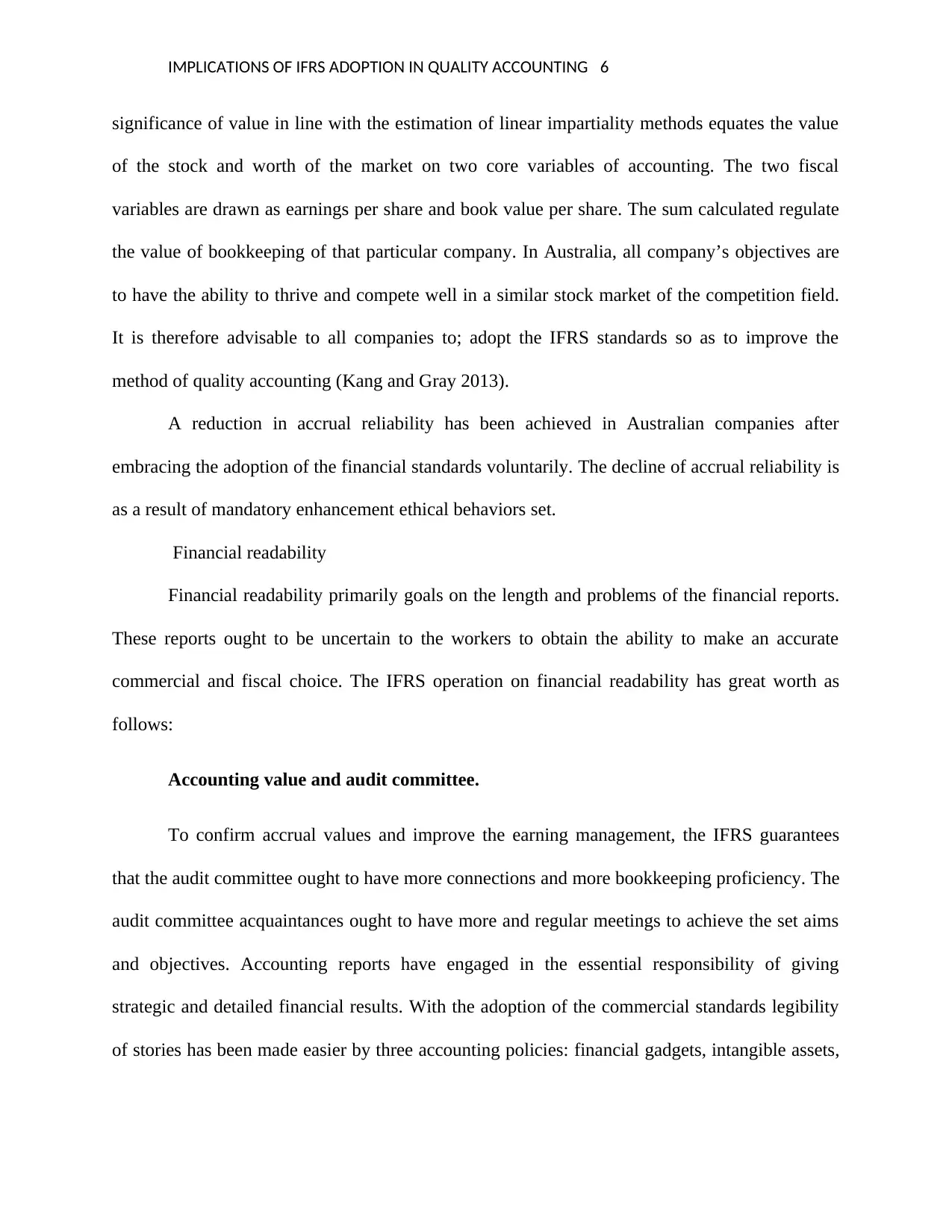
IMPLICATIONS OF IFRS ADOPTION IN QUALITY ACCOUNTING 6
significance of value in line with the estimation of linear impartiality methods equates the value
of the stock and worth of the market on two core variables of accounting. The two fiscal
variables are drawn as earnings per share and book value per share. The sum calculated regulate
the value of bookkeeping of that particular company. In Australia, all company’s objectives are
to have the ability to thrive and compete well in a similar stock market of the competition field.
It is therefore advisable to all companies to; adopt the IFRS standards so as to improve the
method of quality accounting (Kang and Gray 2013).
A reduction in accrual reliability has been achieved in Australian companies after
embracing the adoption of the financial standards voluntarily. The decline of accrual reliability is
as a result of mandatory enhancement ethical behaviors set.
Financial readability
Financial readability primarily goals on the length and problems of the financial reports.
These reports ought to be uncertain to the workers to obtain the ability to make an accurate
commercial and fiscal choice. The IFRS operation on financial readability has great worth as
follows:
Accounting value and audit committee.
To confirm accrual values and improve the earning management, the IFRS guarantees
that the audit committee ought to have more connections and more bookkeeping proficiency. The
audit committee acquaintances ought to have more and regular meetings to achieve the set aims
and objectives. Accounting reports have engaged in the essential responsibility of giving
strategic and detailed financial results. With the adoption of the commercial standards legibility
of stories has been made easier by three accounting policies: financial gadgets, intangible assets,
significance of value in line with the estimation of linear impartiality methods equates the value
of the stock and worth of the market on two core variables of accounting. The two fiscal
variables are drawn as earnings per share and book value per share. The sum calculated regulate
the value of bookkeeping of that particular company. In Australia, all company’s objectives are
to have the ability to thrive and compete well in a similar stock market of the competition field.
It is therefore advisable to all companies to; adopt the IFRS standards so as to improve the
method of quality accounting (Kang and Gray 2013).
A reduction in accrual reliability has been achieved in Australian companies after
embracing the adoption of the financial standards voluntarily. The decline of accrual reliability is
as a result of mandatory enhancement ethical behaviors set.
Financial readability
Financial readability primarily goals on the length and problems of the financial reports.
These reports ought to be uncertain to the workers to obtain the ability to make an accurate
commercial and fiscal choice. The IFRS operation on financial readability has great worth as
follows:
Accounting value and audit committee.
To confirm accrual values and improve the earning management, the IFRS guarantees
that the audit committee ought to have more connections and more bookkeeping proficiency. The
audit committee acquaintances ought to have more and regular meetings to achieve the set aims
and objectives. Accounting reports have engaged in the essential responsibility of giving
strategic and detailed financial results. With the adoption of the commercial standards legibility
of stories has been made easier by three accounting policies: financial gadgets, intangible assets,
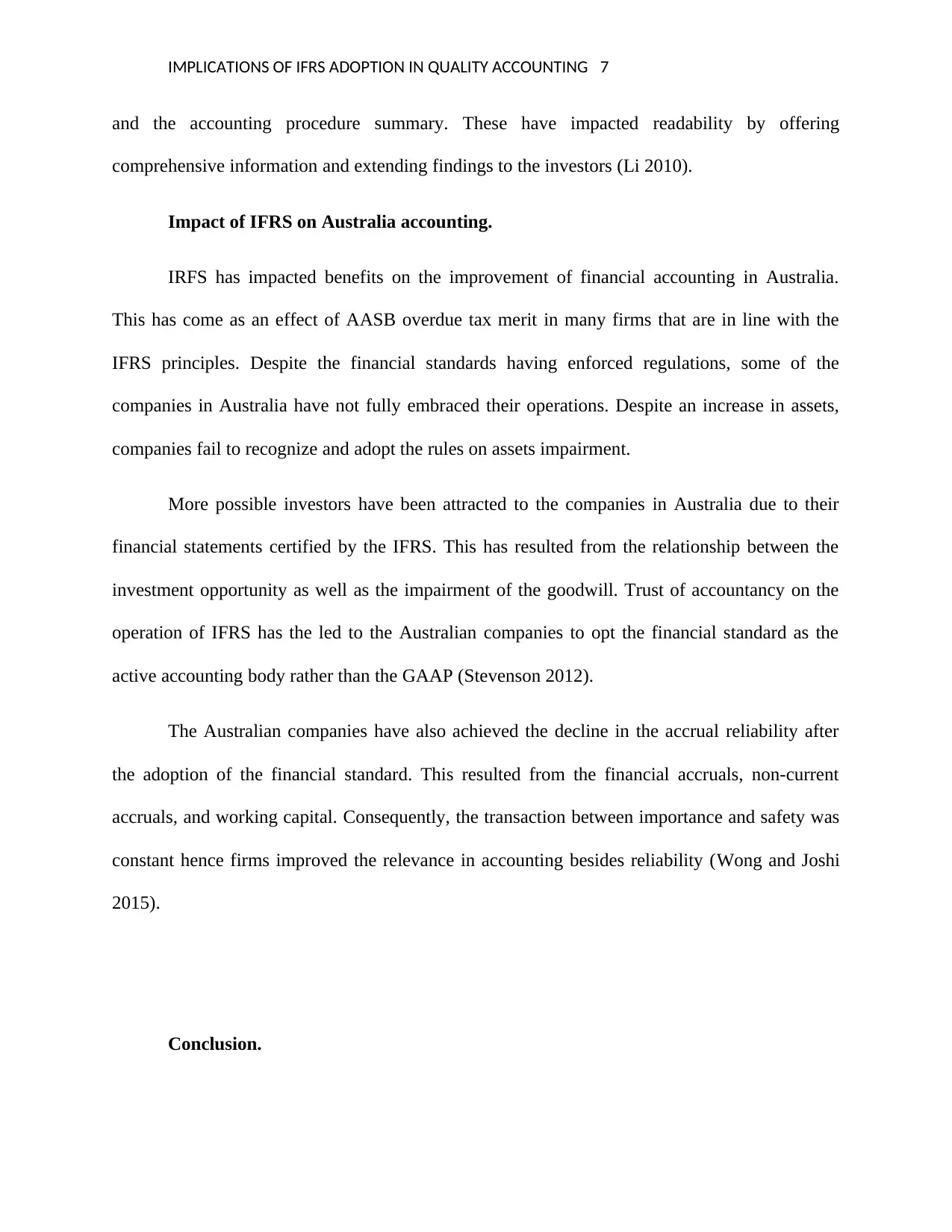
IMPLICATIONS OF IFRS ADOPTION IN QUALITY ACCOUNTING 7
and the accounting procedure summary. These have impacted readability by offering
comprehensive information and extending findings to the investors (Li 2010).
Impact of IFRS on Australia accounting.
IRFS has impacted benefits on the improvement of financial accounting in Australia.
This has come as an effect of AASB overdue tax merit in many firms that are in line with the
IFRS principles. Despite the financial standards having enforced regulations, some of the
companies in Australia have not fully embraced their operations. Despite an increase in assets,
companies fail to recognize and adopt the rules on assets impairment.
More possible investors have been attracted to the companies in Australia due to their
financial statements certified by the IFRS. This has resulted from the relationship between the
investment opportunity as well as the impairment of the goodwill. Trust of accountancy on the
operation of IFRS has the led to the Australian companies to opt the financial standard as the
active accounting body rather than the GAAP (Stevenson 2012).
The Australian companies have also achieved the decline in the accrual reliability after
the adoption of the financial standard. This resulted from the financial accruals, non-current
accruals, and working capital. Consequently, the transaction between importance and safety was
constant hence firms improved the relevance in accounting besides reliability (Wong and Joshi
2015).
Conclusion.
and the accounting procedure summary. These have impacted readability by offering
comprehensive information and extending findings to the investors (Li 2010).
Impact of IFRS on Australia accounting.
IRFS has impacted benefits on the improvement of financial accounting in Australia.
This has come as an effect of AASB overdue tax merit in many firms that are in line with the
IFRS principles. Despite the financial standards having enforced regulations, some of the
companies in Australia have not fully embraced their operations. Despite an increase in assets,
companies fail to recognize and adopt the rules on assets impairment.
More possible investors have been attracted to the companies in Australia due to their
financial statements certified by the IFRS. This has resulted from the relationship between the
investment opportunity as well as the impairment of the goodwill. Trust of accountancy on the
operation of IFRS has the led to the Australian companies to opt the financial standard as the
active accounting body rather than the GAAP (Stevenson 2012).
The Australian companies have also achieved the decline in the accrual reliability after
the adoption of the financial standard. This resulted from the financial accruals, non-current
accruals, and working capital. Consequently, the transaction between importance and safety was
constant hence firms improved the relevance in accounting besides reliability (Wong and Joshi
2015).
Conclusion.
Paraphrase This Document
Need a fresh take? Get an instant paraphrase of this document with our AI Paraphraser
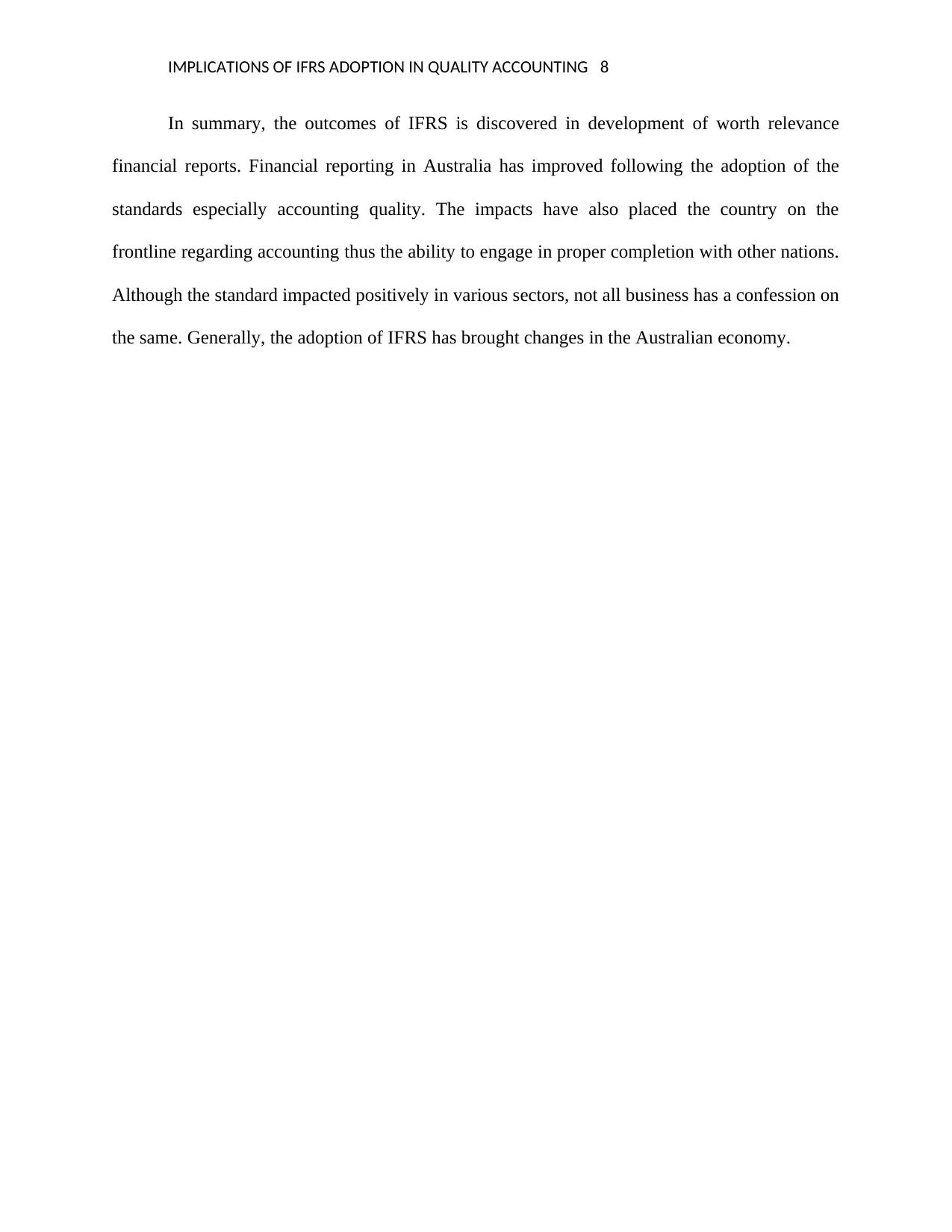
IMPLICATIONS OF IFRS ADOPTION IN QUALITY ACCOUNTING 8
In summary, the outcomes of IFRS is discovered in development of worth relevance
financial reports. Financial reporting in Australia has improved following the adoption of the
standards especially accounting quality. The impacts have also placed the country on the
frontline regarding accounting thus the ability to engage in proper completion with other nations.
Although the standard impacted positively in various sectors, not all business has a confession on
the same. Generally, the adoption of IFRS has brought changes in the Australian economy.
In summary, the outcomes of IFRS is discovered in development of worth relevance
financial reports. Financial reporting in Australia has improved following the adoption of the
standards especially accounting quality. The impacts have also placed the country on the
frontline regarding accounting thus the ability to engage in proper completion with other nations.
Although the standard impacted positively in various sectors, not all business has a confession on
the same. Generally, the adoption of IFRS has brought changes in the Australian economy.
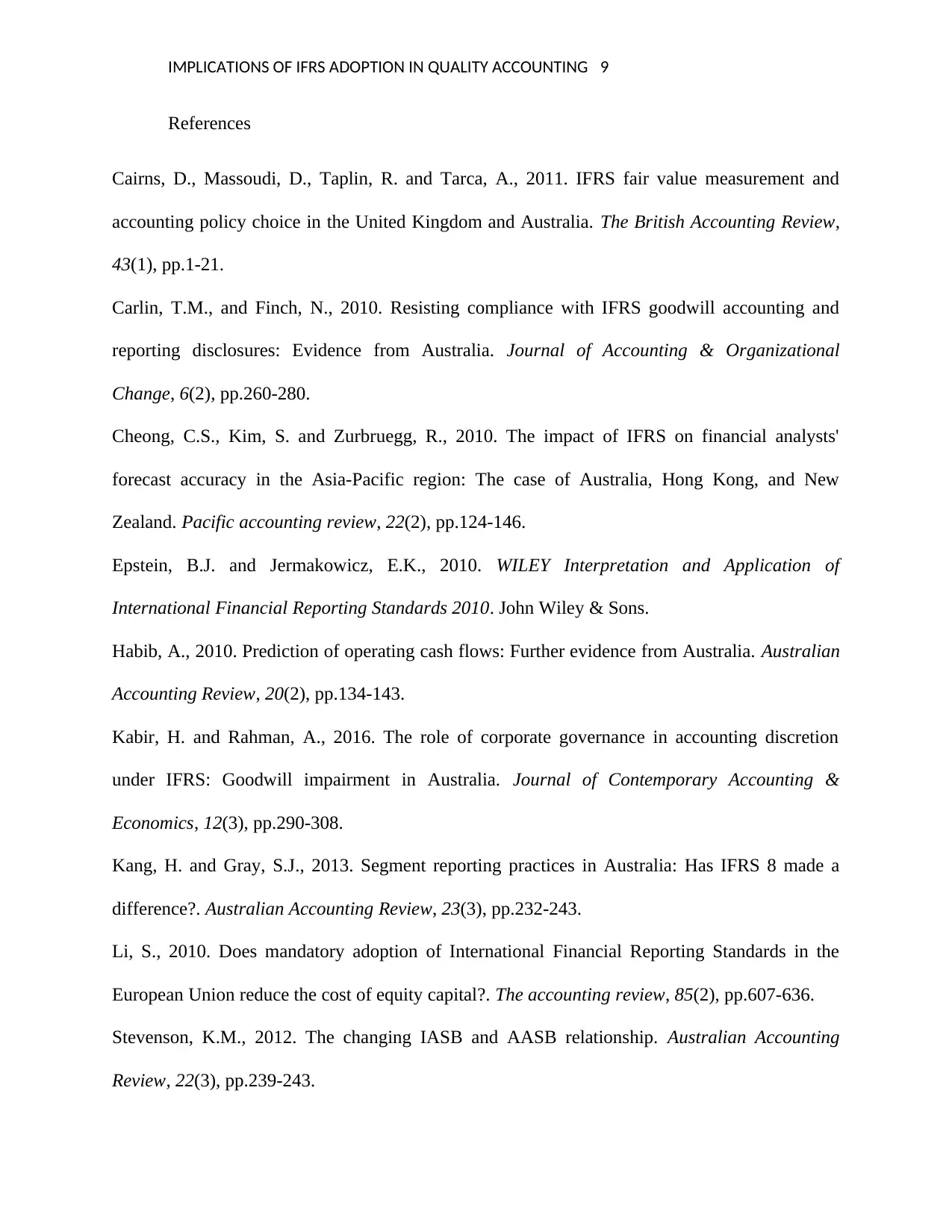
IMPLICATIONS OF IFRS ADOPTION IN QUALITY ACCOUNTING 9
References
Cairns, D., Massoudi, D., Taplin, R. and Tarca, A., 2011. IFRS fair value measurement and
accounting policy choice in the United Kingdom and Australia. The British Accounting Review,
43(1), pp.1-21.
Carlin, T.M., and Finch, N., 2010. Resisting compliance with IFRS goodwill accounting and
reporting disclosures: Evidence from Australia. Journal of Accounting & Organizational
Change, 6(2), pp.260-280.
Cheong, C.S., Kim, S. and Zurbruegg, R., 2010. The impact of IFRS on financial analysts'
forecast accuracy in the Asia-Pacific region: The case of Australia, Hong Kong, and New
Zealand. Pacific accounting review, 22(2), pp.124-146.
Epstein, B.J. and Jermakowicz, E.K., 2010. WILEY Interpretation and Application of
International Financial Reporting Standards 2010. John Wiley & Sons.
Habib, A., 2010. Prediction of operating cash flows: Further evidence from Australia. Australian
Accounting Review, 20(2), pp.134-143.
Kabir, H. and Rahman, A., 2016. The role of corporate governance in accounting discretion
under IFRS: Goodwill impairment in Australia. Journal of Contemporary Accounting &
Economics, 12(3), pp.290-308.
Kang, H. and Gray, S.J., 2013. Segment reporting practices in Australia: Has IFRS 8 made a
difference?. Australian Accounting Review, 23(3), pp.232-243.
Li, S., 2010. Does mandatory adoption of International Financial Reporting Standards in the
European Union reduce the cost of equity capital?. The accounting review, 85(2), pp.607-636.
Stevenson, K.M., 2012. The changing IASB and AASB relationship. Australian Accounting
Review, 22(3), pp.239-243.
References
Cairns, D., Massoudi, D., Taplin, R. and Tarca, A., 2011. IFRS fair value measurement and
accounting policy choice in the United Kingdom and Australia. The British Accounting Review,
43(1), pp.1-21.
Carlin, T.M., and Finch, N., 2010. Resisting compliance with IFRS goodwill accounting and
reporting disclosures: Evidence from Australia. Journal of Accounting & Organizational
Change, 6(2), pp.260-280.
Cheong, C.S., Kim, S. and Zurbruegg, R., 2010. The impact of IFRS on financial analysts'
forecast accuracy in the Asia-Pacific region: The case of Australia, Hong Kong, and New
Zealand. Pacific accounting review, 22(2), pp.124-146.
Epstein, B.J. and Jermakowicz, E.K., 2010. WILEY Interpretation and Application of
International Financial Reporting Standards 2010. John Wiley & Sons.
Habib, A., 2010. Prediction of operating cash flows: Further evidence from Australia. Australian
Accounting Review, 20(2), pp.134-143.
Kabir, H. and Rahman, A., 2016. The role of corporate governance in accounting discretion
under IFRS: Goodwill impairment in Australia. Journal of Contemporary Accounting &
Economics, 12(3), pp.290-308.
Kang, H. and Gray, S.J., 2013. Segment reporting practices in Australia: Has IFRS 8 made a
difference?. Australian Accounting Review, 23(3), pp.232-243.
Li, S., 2010. Does mandatory adoption of International Financial Reporting Standards in the
European Union reduce the cost of equity capital?. The accounting review, 85(2), pp.607-636.
Stevenson, K.M., 2012. The changing IASB and AASB relationship. Australian Accounting
Review, 22(3), pp.239-243.
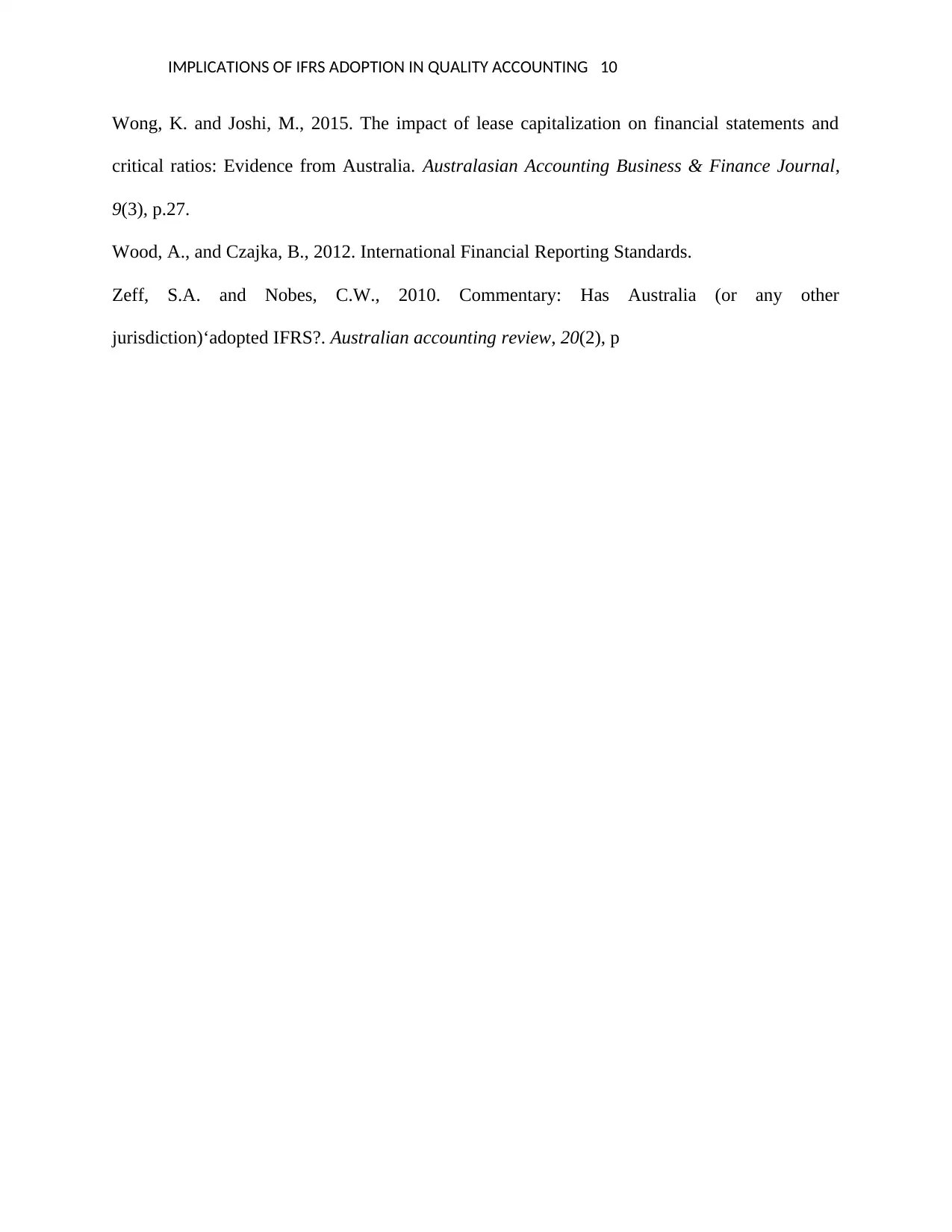
IMPLICATIONS OF IFRS ADOPTION IN QUALITY ACCOUNTING 10
Wong, K. and Joshi, M., 2015. The impact of lease capitalization on financial statements and
critical ratios: Evidence from Australia. Australasian Accounting Business & Finance Journal,
9(3), p.27.
Wood, A., and Czajka, B., 2012. International Financial Reporting Standards.
Zeff, S.A. and Nobes, C.W., 2010. Commentary: Has Australia (or any other
jurisdiction)‘adopted IFRS?. Australian accounting review, 20(2), p
Wong, K. and Joshi, M., 2015. The impact of lease capitalization on financial statements and
critical ratios: Evidence from Australia. Australasian Accounting Business & Finance Journal,
9(3), p.27.
Wood, A., and Czajka, B., 2012. International Financial Reporting Standards.
Zeff, S.A. and Nobes, C.W., 2010. Commentary: Has Australia (or any other
jurisdiction)‘adopted IFRS?. Australian accounting review, 20(2), p
Secure Best Marks with AI Grader
Need help grading? Try our AI Grader for instant feedback on your assignments.

IMPLICATIONS OF IFRS ADOPTION IN QUALITY ACCOUNTING 11

IMPLICATIONS OF IFRS ADOPTION IN QUALITY ACCOUNTING 12

IMPLICATIONS OF IFRS ADOPTION IN QUALITY ACCOUNTING 13
1 out of 13
Related Documents
Your All-in-One AI-Powered Toolkit for Academic Success.
+13062052269
info@desklib.com
Available 24*7 on WhatsApp / Email
![[object Object]](/_next/static/media/star-bottom.7253800d.svg)
Unlock your academic potential
© 2024 | Zucol Services PVT LTD | All rights reserved.





